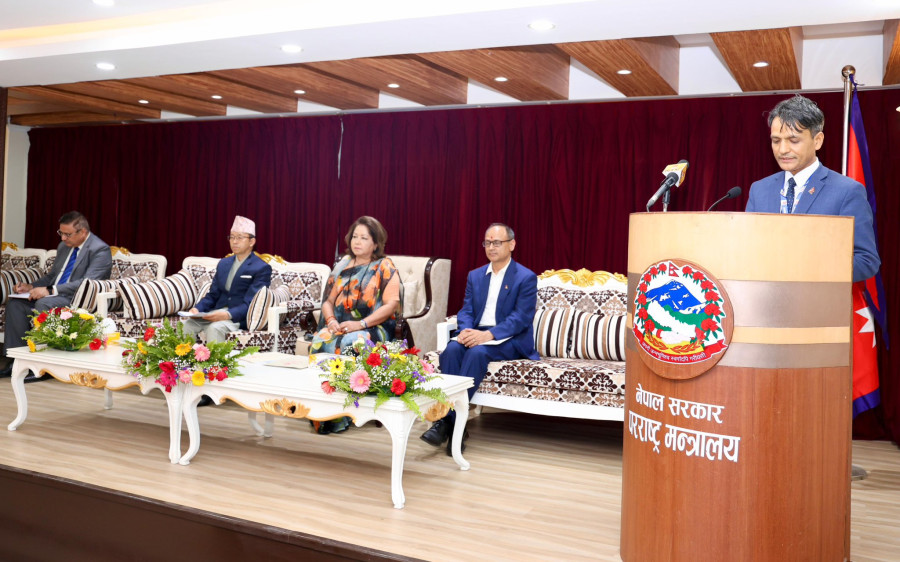National
No foreign head of state, government attending Sagarmatha Sambad
Political participation would be crucial to the dialogue’s success. Officials hope to do better in the next edition.
Anil Giri
In what may be deemed the country’s diplomatic failure, no foreign head of state or government is attending the much touted Sagarmatha Sambad, a multi-stakeholder dialogue forum launched by Nepal to deliberate on the most prominent issues of global, regional and national significance.
The first edition of the flagship dialogue is scheduled to take place from May 16 to 18 on the theme “Climate Change, Mountains and the Future of Humanity”. It will be inaugurated by Prime Minister KP Sharma Oli in Kathmandu on Thursday.
Earlier, the government had tried hard to ensure high-level participation from India, China and other regional countries at top political level but that could not materialise due to poor diplomatic outreach.
Inspired by global platforms like the World Economic Forum in Davos, the Shangri-La Dialogue in Singapore, and the Raisina Dialogue in New Delhi, the Sagarmatha Sambad was first announced by the previous Oli government in 2019, but was cancelled due to the Covid pandemic.
The events in Davos, Singapore, New Delhi and others are jam-packed with high-level representation from abroad but the Nepal government has put the heads of Kathmandu-based diplomatic missions and donor community on the list of high-level representatives.
“These members of the diplomatic community and donor community attend regular events and dinners in Kathmandu and including them in the list of high-level delegations is a joke,” a former Nepali ambassador said.
In order to make the event a success, the government had invited over 350 delegates including several heads of state and government. Indian Prime Minister Narendra Modi was among them. But not a single head of state or government is participating in the three-day event.
According to Foreign Minister Arzu Rana Deuba, out of total invitees, only half are attending, with high-level participation from 12 countries confirmed as of Tuesday. But most of these high-level participants are either environment ministers, or special envoys on climate change or equivalent position holders.
Minister for Environment Bhupendra Yadav will be representing India while Vice Chairman of the Standing Committee of the National People’s Congress and former finance minister, Xiao Jie, is leading the Chinese delegation at the event.
Krishna Prasad Dhakal, spokesperson for the foreign ministry, said: “This being the first edition of the Sambad, probably the heads of state or government could not attend. But from next time, we can expect them too.”
Nepal invited several heads of state and government but not one is joining this time, Dhakal admitted.
“We tried hard but failed. Let’s hope the political leadership of other countries can join us in future editions of the Sagarmatha Sambad,” Dhakal told the Post.
UN secretary general António Guterres, one of the invited dignitaries, is not attending in person. He will address the event through a video message.
Most of the foreign delegates are either from the agencies related to the United Nations, from INGOs and the donor community, said officials. The government could not secure high-level political participation despite active efforts of the foreign ministry and the Nepali embassies.
The first edition of the Sambad will see discussions on various facets of climate crisis ranging from the mountain to oceanic nations, issue of mountain economy, linking science to climate change, the issue of loss and damage caused by climate change, clean energy, food security and energy, and rising temperatures.
But the absence of political leadership and commitment means the objective of the event will not be met, a foreign ministry official said. “It would be great to see some towering figure from the region or the United Nations Secretary General attending.”
The event aims to develop a common understanding of the impact of climate change on mountain countries, advocate for climate justice for those bearing the brunt of carbon emissions, and develop bilateral and multilateral partnerships for climate finance and technological advancements.
It will also be an initiative for the inclusion of mountain countries in the UN Framework Convention on Climate Change (UNFCCC) dialogue.
Instead of a government-organised summit, it should have been a private sector-led, track two initiative with the Nepal government supporting it, said Nischal Nath Pandey, director of the Centre for South Asian Studies (CSAS), a think-tank based in Kathmandu.
“President Trump withdrew from the Paris Climate deal, so the rich nations of the global north are not fulfilling their pledge to mobilise climate financing even though they are responsible for the majority of greenhouse gas emissions,” Pandey said, presenting a case of lost objective without major political commitment.
These issues are best highlighted by a track-two advocate than a government minister who has to stick to written statements full of diplomatic propriety, Pandey added.
According to Minister Deuba, the event will feature parliamentarians, ministers, and climate experts. Foreign delegates attending the Sambad will also have courtesy meetings with Prime Minister Oli, as well as sideline discussions with their Nepali counterparts.
“The dialogue will have 12 thematic sessions, addressing topics such as the urgency of limiting global temperature rise to 1.5°C, sustaining mountain economies, loss and damage in island nations, and promoting gender and intergenerational equity in climate action,” Deuba said.




 13.12°C Kathmandu
13.12°C Kathmandu














